ADHD (Attention Deficit Hyperactivity Disorder) has become one of the most common conditions in the world. It appears in children, teens, and adults. Usually diagnosed in early childhood, the disorder often continues into adulthood.
Even though there’s been plenty of research, scientists are still unable to name the specific causes of ADD (Attention Deficit Disorder). There is currently no cure.
What we do have however, is a means of recognizing the condition and ways of dealing with it. That’s what we want to share with you today.
At IvyPanda, we have put together the most crucial pieces of information about ADD to create a definitive guide. It’s divided into five sections that outline key ADHD issues, offer some useful study tips, provide tools and resources for students, and recommend where to get help.
Let’s get started!
🤸 The Issue of ADHD
What are the ADD Symptoms?
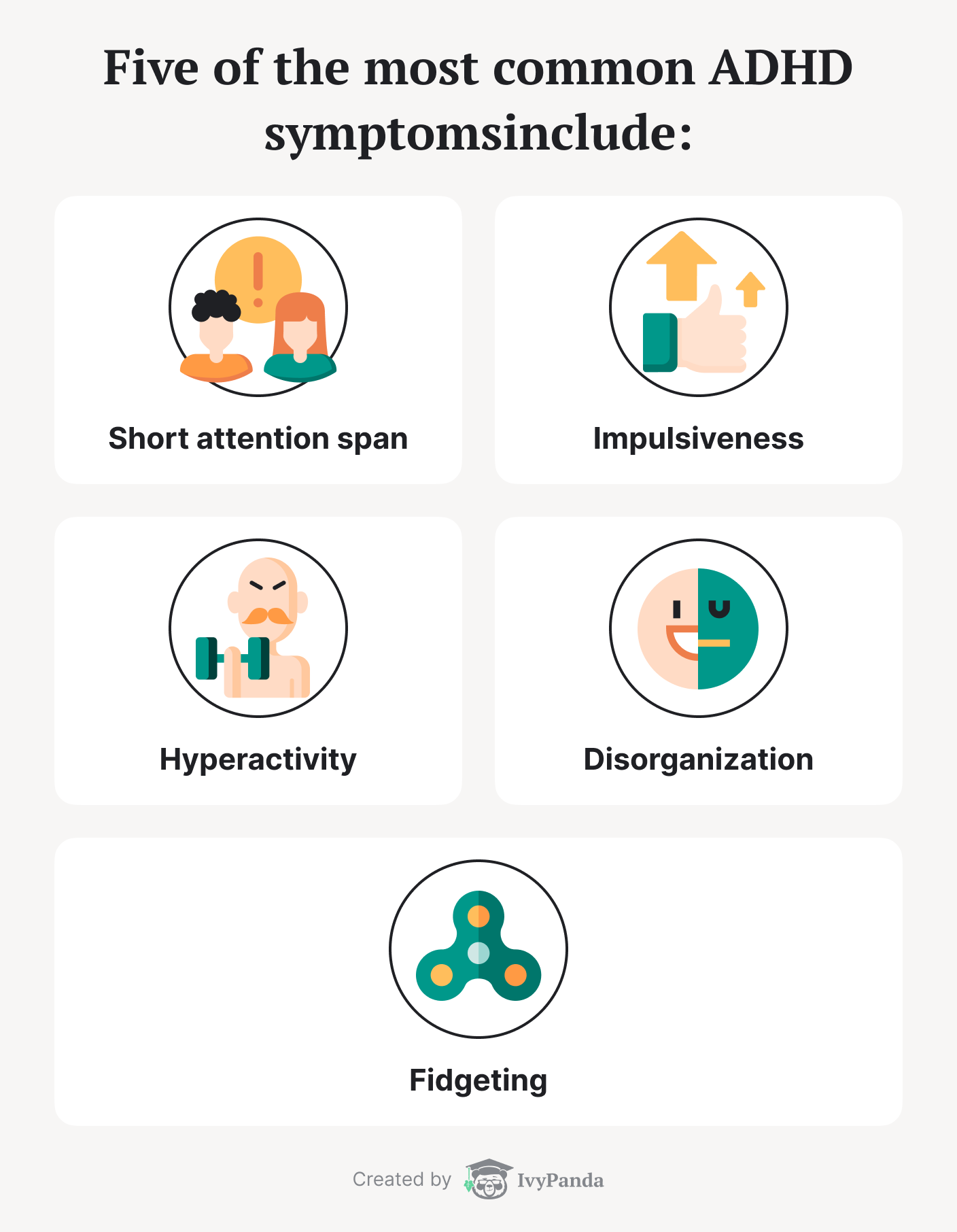
People used to think that ADHD could only be found in kids (boys in particular). However, we now recognize that adults also suffer from ADHD.
Simple hyperactivity typical of children, can evolve into a much more serious condition that interferes with everyday life, if left untreated.
Here are some of the symptoms that indicate you might have ADHD.
1. Lacking focus or being hyper focused. Lack of focus is one of the main signs of ADHD. It is far more significant that simply not paying attention. People usually get distracted easily, even during a simple conversation.
On the other hand, there’s being hyper focused; when the person gets so involved in something, that they don’t notice anything else. This can lead to some of the other problems on this list.
2. Forgetfulness. The crucial difference between occasional episodes of forgetting something and forgetfulness as an ADHD symptom lies in it being a part of everyday life. With ADHD, it happens all the time, and it doesn’t matter if the thing the person forgets is unimportant or crucial.

3. Issues with time management. This is one of the things being hyper focused can lead to, it is another factor that can contribute to an inability to use time effectively. This includes procrastinating when important tasks need to be accomplished or ignoring something because it feels boring.
4. Impulsiveness. This symptom can express itself in multiple ways. It can cause impulse buying or acting without thinking about the consequences. The person can also be socially inappropriate, interrupt others in the middle of a conversation, or rush through daily tasks.
5. Problems with self-organization. This is another factor that contributes to difficulties with time management. You know the feeling when you are having a busy day, and everything seems chaotic? Well, people with ADHD often experience that feeling constantly.
6. Fatigue, anxiety, and restlessness. Restlessness and fatigue may seem like opposites. However, there’s a logic here:
Restlessness may manifest as a willingness to continuously keep doing something and getting frustrated if you’re unable to (which can then lead to anxiety). After a full day of hyperactive behavior, it’s only natural to feel tired.
Another reason for fatigue is the constant effort required to keep yourself under control and focused.

7. Low motivation and self-esteem. When you want to do numerous things at once, but never have enough time to do them or finish them properly, it can lead to a lack of motivation.
Hyperactivity and an inability to concentrate can also lead to a lowered self-image. Disorganization can feel like underachievement or personal failure, which can result in low self-esteem.
8. Relationship problems. This one is true for all kinds of relationships, whether it’s work, friends, or romantic relationships. People with ADHD tend to be inattentive, often speaking over someone, or getting bored easily. This can easily take a toll on relationships.
9. Emotional and health issues. Impulsiveness can often lead to developing bad habits, such as unhelpful eating habits or the neglect of personal health and wellbeing.
There are plenty of other indicators of ADD, the above are the most common ones.
If you experience any of the listed symptoms, this might be a good motivator to visit a medical professional, run some tests and explore a potential ADD diagnosis. If you’re interested in studying the topic further and seeing what latest developments have been made, check out some works in an essay database.
We’ll tell you more about that later on, so stay tuned.

Types of ADHD
You may be aware of both terms—ADD and ADHD. What is the difference between them?
ADD is a term that was first used to describe a condition where a person is having trouble paying attention, but doesn’t experience hyperactivity.
ADHD is an overarching term and the official name for the condition, as outlined in the APA’s 2013 Diagnostic and Statistical Manual of Mental Disorders. ADD is now considered a type of ADHD.
What other types of ADHD are there?
1. Classic ADHD. This is the most common type. Hyperactive traits are noticeable early in childhood and change their form as the person grows up.
This can include being exceptionally active as babies to restless, impulsive, and noisy children, to having overwhelming and conflict-driven behavior later on.
2. Inattentive ADD. The defining trait of this type of ADHD is that the person is usually calm, quiet, and introverted. Some may consider them unmotivated.
Inattentive ADD may often go undiagnosed, mainly because it lacks the hyperactivity component and draws less negative attention.

3. Anxious ADD. As the name suggests, this condition includes anxiety. As a result, the treatment requires not only brain stimulation but also the need to calm the effects of anxiety.
4. Overfocused ADD. While most people with ADD struggle to concentrate on one thing, those with overfocused ADD often find it hard to shift their attention.
This may include being hyper focused on a certain task and an inability to get rid of negative thought patterns and behaviors. This can manifest itself for example, in substance abuse.
5. Ring of Fire ADD. The standout characteristic for this ADD type is overall high brain activity. People with this type of ADD may struggle to rid their brain of overwhelming emotions and thoughts.
This may include elements of bipolar disorder. Traditional ADHD medication may not be as effective for this type of ADD.
6. Limbic ADD. This type of ADHD is characterized by frequent mood swings, overall negativity, low energy, irritability, and low self-esteem.
The hyperactivity aspect may or may not be present. People with this ADHD type often lose interest in things, experience sleep changes, and tend to isolate themselves socially.
7. Temporal lobe ADD. Apart from typical ADHD symptoms, people with temporal lobe ADD also struggle to learn something new and memorize material. They have unstable moods, tend to be aggressive, and have outbursts of temper.
ADD Treatment
With so many ADHD types, it sure is tough to find a single way of treating them all. What works well for one group of people may be completely useless for another.
The key is to find the perfect combination of coping methods that’s perfect just for you. Some rely solely on medications, and others prefer therapies and more practical approaches.
In this section, we want to give you some general tips for managing ADHD that are likely to be suitable for the majority of people.

Developing habits
This is one of the most effective methods to make things done when you struggle to focus on them.
Developing the habit might take some time, but once it’s done—you’ll be able to do those things almost automatically.
- Take advantage of calendars and planners. It’s up to you to choose whether to use a physical one or go with the app on your phone. The goal here is to help you remember all your assignments and never miss important deadlines. The benefit of choosing a digital planner is the ability to set reminders, so there’s practically zero chance of missing anything crucial.
- Have designated areas around your home. Decide on what things are essential for your everyday life and put the rest away. Store different objects in specific places, so you know that they’re always there.
- Deal with small tasks right away. If it takes you about two to five minutes to do something, you’ll need to do anyways—go for it. Trying to postpone it for later may just end up with you forgetting about it. Or you might remember to do that small thing and miss something more important instead.
- Make lists and notes. This is another strategy for you not to forget anything important. Again, you may pick either physical or digital note-taking option—whichever suits you more.

Managing time
This is a big one, based on what we’ve discussed earlier. Mastering time management alone may be a big enough game changer for some adults with ADHD.
- Watch the clock. You always need to track time. Whether it’s a wristwatch, a big, noticeable wall clock, or the one on your desk. Check the time regularly and say it aloud whenever you start a new task.
- Leave extra time for yourself. If estimating time is your weakness, this little hack might be helpful. Whenever you try to predict how much time a certain task or activity will take you, add an extra ten minutes for every half an hour. For instance, if you think you’ll get to your friend’s house in an hour, tell them you’ll be there in an hour and twenty minutes. Another trick is to plan to come earlier, which will also give you a time cushion.
- Use timers. Again, there’s no such thing as too many means to remind yourself about something when you try mastering time management. Set a specific time for tasks and turn on the alarm to go off when it’s time to stop.
Organizing paperwork
A bunch of papers lying around your place won’t make coping with ADHD easier. So, if paperwork is a part of everyday life, it’s better to address it too.
- Lower the number of papers you receive. If the option is available, request to receive your bills and statements in electronic format instead of paper. This will definitely reduce the clutter.
- Don’t let your mail pile up for days or even weeks. Deal with it as soon as you receive it. It’ll prevent you from distracting later, and you won’t forget about it too.
- Introduce a system. Sort your paperwork into separate folders. It will prevent you from losing important documents and allow you to find something you need quickly. Color-coding will make searching for a particular paper even faster.
Prioritizing
Impulsivity can easily ruin plans for the whole day. That’s why it’s important to set priorities and tackle the tasks in order.
- Start with things that are the most important.
- Once you’ve started the task, stay on it until you’re done or the time for it runs out.
- If you’re working on a big project, don’t perceive it as a whole. Break it down into multiple steps to make it seem manageable.
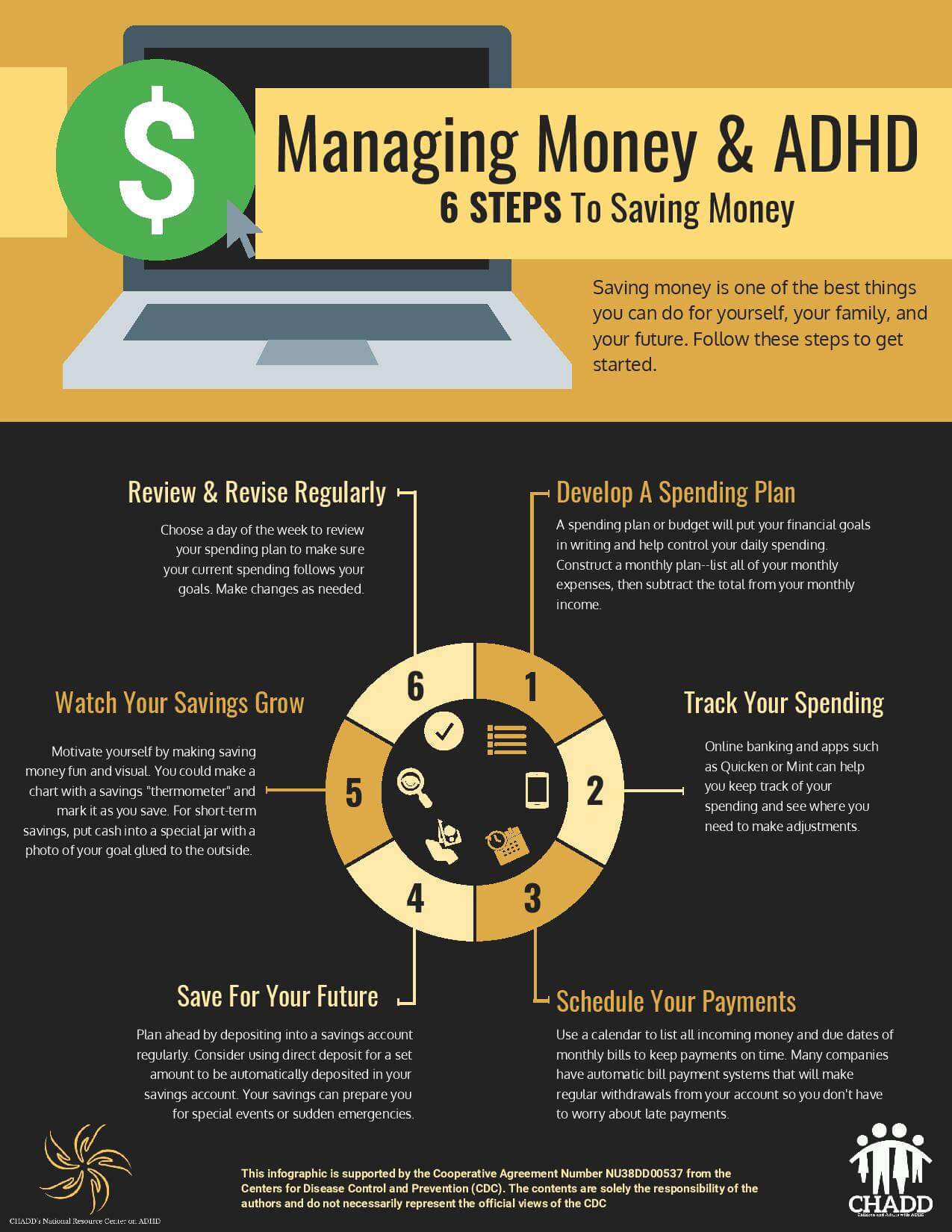
Budgeting
To be able to control your budget effectively, you first need to assess the financial situation you’re in. Start keeping track of your expenses to analyze your spending in the future and take measures.
After that step is done, you can plan out your budget and allocate a specific amount on money to different spheres of your life.
Saving receipts and bills helps too if you want to organize a spending-tracking system.
- Use special services to keep track of your finances. It’s going to be worth it to spend some time setting it up after you see how much easier it is to control your money flow.
- Switch to internet banking. With this change, you won’t ever have to guess whether or not you’ve balanced your budget properly. You’ll be able to see all your finances’ movements, which will simplify future planning.
- Set up reminders for bill payments. Yes, this is yet another reminder. You can even go all in and set up automatic payments. But if you prefer to do it yourself, a payment reminder will do the trick.
Removing distractions
A proper environment is extremely crucial for people with ADHD, whether it’s for work or study.
- Have your workplace as empty and quiet as possible. Working or performing other important tasks won’t be easy if someone near you is talking, or if there are many objects to distract you.
- It would be a good idea to have your work desk face the wall and keep only essentials on it. To discourage interruptions, turn off all the notifications and activate voicemail for your phone. If you’re not alone in the house, you can even put up the “Do not disturb” sign. Noise-canceling headphones are another good idea to prevent you from being distracted in a noisy environment.
- When ideas start appearing in your head while you’re working, don’t let them throw you off your course. Have a notebook ready for such occasions. Whenever an interesting thought comes to mind, write it down and keep on working. Notes on your smartphone work, too, if you have a strong enough willpower to just write it down without checking a couple of other apps.

Improving focus
For an adult with ADHD, it’s not hard to focus on something. The hard thing is maintaining that focus for long enough. The situation gets worse if what you’re trying to concentrate on isn’t particularly exciting.
- When you get directions from someone, repeat them aloud. This will ensure you got everything right and help you memorize them.
- Write things down. When you’re at a lecture or meeting, ask for a copy of all the essential materials. Make notes while you’re listening to reinforce memorization with active listening while writing everything down.
- Involve movement. Depending on the situation, you can try and move around if you’re not disturbing anyone to keep yourself from fidgeting and getting distracted. A small squeezing ball, fidget toy, or silent Rubik’s cube might also help.
Taking care of health and general wellbeing
In terms of health and wellbeing, the recommendations don’t really differ regardless of whether you have ADHD or not. What sets them apart are goals. While other people usually exercise to stay fit, people with ADHD look for reducing the hyperactivity factor, improve their mood, and calm their thoughts.

- Exercise every day. You want to look at something intensive or something you can do with a friend. Any team sport or simply working out with a partner will do.
- Go outdoors. Natural surroundings will make the exercising effect even more fulfilling.
- Relax and meditate. Try yoga to relieve your stress and better control the impulses. If you’re not a fan of that, you can just do calm walks while setting your thoughts in order.
Finding Benefits in Attention Deficit Disorder
It can’t be all that bad, right?
Yes, it’s true. If you look at the bright side, it’s possible to pinpoint some of the positive sides of ADHD.
Let’s take a look at what they are.
- Hyperfocus. Even though it was listed as a symptom, it also is a strength. It enables channeling all the attention at completing a task, which can lead to extraordinary achievements.
- People with ADHD are resilient. They encounter enough challenges and have to push forward no matter what.
- Fascinating personality. Again, facing as many challenges as people with ADHD do, teaches you a ton of life lessons. People who constantly conquer difficulties aren’t afraid of self-deprecating humor and usually aren’t deprived of wit.
- Ingenuity. Once a person with ADHD is able to harness their creativity—wonderful things can happen. Their mind can go wandering around and come up with exceptionally creative ideas and concepts.
- Strong conversation skills. Even though it might take some practice to stop interrupting others, people with ADHD can usually start a conversation or discussion with ease.
To sum it all up, it’s fair to say that in terms of discussing the way ADHD manifests itself in different people, determining what’s good and what’s bad is only a matter of perspective.
With a proper mindset and a goal in mind, it’s possible to turn things around and transform even the most hopeless weakness into a strength.
📚 ADHD Study Tips
Studying may be exceptionally tough for those who live with ADD.
Why?
Because it requires students to spend a lot of time sitting in one place, being concentrated, and remembering tons of information. It’s almost everything ADHD students (or any people with the condition) struggle with.
So in this section, we’ve collected different pieces of advice aimed at making studying more ADD-friendly.
General Recommendations
Any tips and suggestions for people with ADHD, whether it’s working, studying, or everyday life tips, have one thing in common.
What thing?
It’s battling the hyperactivity factor and helping people find ways to be less distracted. Another goal is being able to retain focus when needed.

Here are some general suggestions on how students can improve their studying process.
- Take your learning preferences into account. Whether you’re visual, auditory, or kinesthetic learner—take the most advantage out of it. To help yourself comprehend and memorize new material, say it out loud, write down, or make a little illustration of it, depending on your preferred learning style.
- Make yourself interested in the subject. Otherwise, learning it would be a real struggle. You can dedicate some time to dive deep into one particular aspect of a subject until you know it enough. This will make you more engaged with it, allowing you to keep studying with more interest. You can set studying goals to motivate yourself, too.
- If you need to study a chapter in the book, start off by looking through headings in it and reading all the given definitions, questions, or summaries. This will make you more familiar with the contents and won’t be such a distraction later.
- Have a partner to study with. We’re talking about not only asking for help but setting study sessions. Meet somewhere and work on your assignments together. You can give quizzes to each other and help stay focused.
- Use online tools and other available resources. There’s plenty of materials online, and you can definitely find something extra on the topic that you’re studying. Some specialized tools can also be of great help. We’ve prepared a list of such tools in the next section of our guide, so keep reading if you want to check them out.
- Having short pauses between different tasks is a good idea. However, it’s possible that once you start dealing with the new assignments, you’ll immediately feel discouraged and not willing to go on. To prevent that from happening, do a small percentage of a new task before going on a break. When you come back, you’ll already have a few steps completed, so it will be easier to keep working.
- If you find it hard to get organized, you can make a “start pad.” Use it to collect all the essential things you’ll need throughout the day, as well as leave written reminders on it about the most important things you need to do.
- Let procrastination in. Even though it seems counterproductive, you shouldn’t fight the urge to procrastinate at all costs. But remember that once the time comes and you have no choice but to complete the task, at least some work has to be done beforehand. For example, if we’re talking about the paper, you need to have research done and sources ready. A written outline would also be nice.
- If it’s hard for you to get engaged with the task, try the 5 minutes challenge. Set a timer and focus on working on the task in question until the timer runs out. When this happens, you may be involved enough to keep going. If not, repeat the procedure one more time.
- Approach your assignments with an open mind. Remember that you’re not forced to complete them. It was rather your own choice, with a certain goal in mind. Being mindful helps to get more motivated. You need to understand that it’s not What or How you do it, but rather Why.
- Take care of organizing your note-taking too. When you mindlessly try to write down everything that the professor says in the lecture, you’ll probably have a hard time finding the main points in your notes later. Try to find the most comfortable spot in the class and use one of the many note-taking techniques available.
- Instead of reading the book over and over, you can try having a practice test. Write down questions based on the material you have to study and answer them using the available information. The whole process will be less passive and more involving.

Study Strategies
An important thing for ADHD students to excel in studying is to have the selection of strategies that work just for them.
To be able to pick them, one must know their strengths and weaknesses, and what aspects of studying they usually have problems with.
We’ve prepared a selection of study strategies and techniques that can be useful and improve the learning process for you.
1. Avoid cramming. This is never a good idea, and it’s even less effective for ADHD students.
The whole goal of cramming implies that you’re going to sit for a long time trying to remember as much material as possible in a limited time. Which is nearly impossible for someone who struggles to concentrate on one thing.
Instead, try to implement the concept of distributed practice. It means that you’re going to study the subject for a couple of days for short periods of time. It can be, for instance, four days, 45 minutes per session, which will total into 3 hours. The best part that you’ll also use the advantage of sleep. When you’re asleep, your brain organizes the new knowledge, and it’s easier to recall later.
2. Don’t underestimate exercising. We’ve already mentioned it earlier, but numerous experts recommend exercising for a reason.
Even half an hour of aerobic exercises four to five days a week will greatly improve your executive functioning and ability to focus.
3. Use more senses. If you’re able to distinguish smells, why not take advantage of it?
Scientists discovered the brain’s ability to recall something better when a person is exposed to the same scent when studying and sleeping. To try that out, put a small bowl of essential oils near you while studying, and then during sleep.
You can also pick the scent that will also bring the relaxing effect.
4. Short midday breaks. Just as you take breaks between the tasks, it’s also a good idea to pause during the whole day.
How?
Take a short 30-minute nap! Make sure that it’s no longer than that. Otherwise, it may alter your sleep schedule. Set an alarm. Or even better—ask someone to wake you up. Because if you hit “Snooze”, your plan won’t work.
This is going to be another opportunity for your brain to organize all the new knowledge.
5. Have a drink rich in glucose. Glucose in apple juice or Gatorade acts as a strong boost to your brain’s cognitive function.
An important thing to remember, though, is that you only need just a sip every now and then. Don’t try to empty the whole glass or bottle in a couple of minutes. Glucose overload will make your thinking cloudy later on, which won’t help your performance.
Test and Exam Tips
Tests and exams are challenging as it is. Bit it all goes to a whole new level for ADHD students.
For that reason, we’ve got a couple of suggestions on how to make exams and tests more manageable.
1. Be aware of the problem. The biggest issue ADHD students run into is test anxiety. It can happen to any students, but in the case of those with ADHD, it can be much more severe.
Test anxiety makes it hard to concentrate, recall information, and pay enough attention. It all results in poor performance, despite the fact that the student could’ve spent plenty of time on preparation.
So, the first step would be acknowledging the issue and recognizing its signs to tackle it successfully.
2. Make your preparation at home more focused. Don’t let the anxiety build up while you’re getting ready. Otherwise, it can worsen the result.
If you feel that things begin to go wrong, involve cognitive rehearsal. Imagine the perfect scenario of the test day instead of dreading how bad it can be.
Another method is using an outlet for your anxiety. Write about your feeling or find someone to talk to about it.
3. Be physically prepared. Apart from learning all the necessary materials, your mind and body should be ready too.
This means getting enough sleep, exercising, and eating right. Also, you should know when is the best time for you to study. Assign the preparation session for when you think your brain responds the best to memorize new information.
4. Have a strategy ready for the test day. You don’t want to freeze up and sit helpless in the class. So, it’s better to have an action plan ready beforehand.
- When the test starts, relax, close your eyes, and take a deep breath.
- Fully study your test sheet before writing anything.
- Check directions to make sure you understand them. Check a couple of times if needed.
- Break the test down. Try to deal with test tasks in segments of fifteen to twenty minutes. As the segment is about to end, take some time to review the work you’ve done so far to make sure there are no mistakes.
- Remember to take breaks to avoid being overwhelmed.
- If you like you’re stuck, it’s better to move to the next task and come back later. You’ll have other parts of the test done instead of wasting all the time on a single tough question.
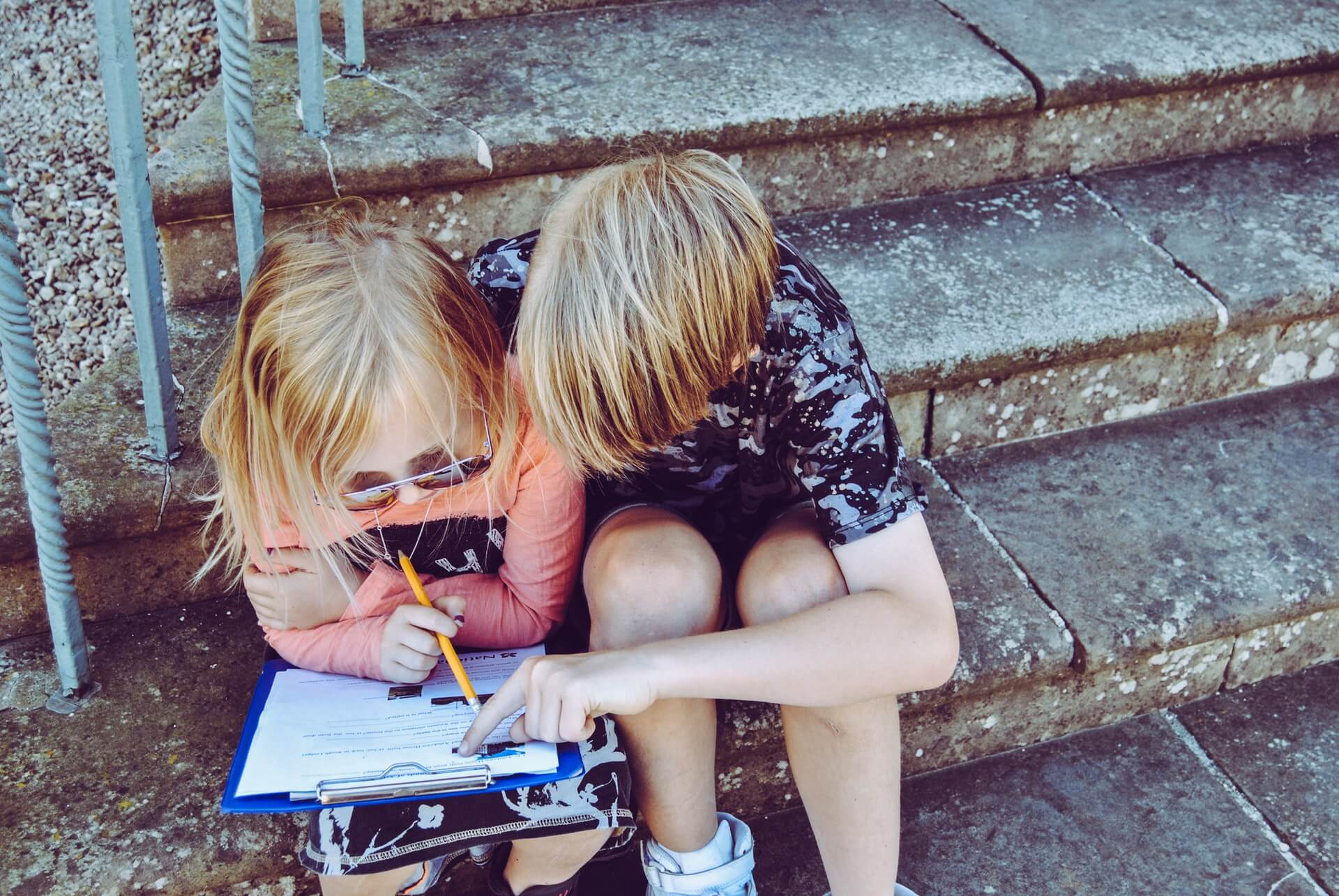
Homework Tips
Completing homework is when the student’s ability to concentrate and stay focused is put to the test.
There are a couple of tips we want to share for ADHD students to have consistently good performance.
- Just as you have a schedule for classes, create one for dealing with homework. This way, the whole process will go in a more organized manner. And you’ll know exactly when it’s time to move on.
- Don’t be afraid to ask for help. If you missed some crucial details about the topic or need an extra explanation, reach out to those who could assist you. It can be someone from your friends or even your teacher. Later in the article, we’ll tell you more about where you can get help.
- Remember about the breaks. It’s not a great idea to try and complete all the assignments in one long burst. Not even for a student who doesn’t have ADHD. Once you’re done with one task, take a break and mentally prepare yourself for the next one.
- Improve the organization. Have all the necessary supplies ready beforehand so that you didn’t have to interrupt the process later to get what you need. The same goes for all the additional study materials: checklists, plans, outlines, lecture notes, etc.
- You can do better if you want to. We know that you might already be trying that as hard as you can. If the result still isn’t satisfying, add some positive reinforcement. Come up with some small rewards you’ll get in case of successfully finishing an assignment. Just be honest with yourself and don’t try to cheat, as it won’t bring you closer to your goal.
- Stay within your limits. It’s important to know when to stop, so don’t push yourself too hard. If you feel that you start getting frustrated and overwhelmed—it’s better to put everything aside for a while than to reach the breaking point and achieve nothing at all.
🛠️Useful Tools and Sources for ADHD Students
Now it’s time to have a look at some of the most useful apps and services that can immensely improve the studying experience of any ADHD student.
After that, check out the list of websites and resources created to help out people living with the condition.
Apps and Services

This app enables you to set up reminders and assign new tasks in a blink of an eye. All thanks to its sheer simplicity. There are no confusing options and settings. The app shows only what’s important: the reminder itself, and the alert time.
2. EpicWin
This is a to-do list app. But it’s unlike anything you’ve ever seen before. EpicWin brings an element of a role-playing game into your everyday life. So, instead of just completing your chores and other tasks, you’ll be getting actual rewards with this app. You have a character that you’ll have to improve and develop using the experience points. You’ll be getting those points for completing the daily tasks you set for yourself. There’s so much more to this app, so you definitely should check it out. It’s available on Android, too.
3. Clear Todos
This simple app is going to help you keep all your lists in order. In the process of designing the app, the main focus was on its flexibility and simplicity. It all resulted in a tool that’s quick and easy to use. There’s only going to be you and your list, without any outer distractions.
Dragon Anywhere is a voice recognition app that can convert your speech to text. Powered by an advanced engine, the app adapts to your voice and works more accurate the more you use it. It understands specific terms, makes it possible to create text macros, and manage your documents. For instance, you can send the text you’ve dictated via email or save it as a note.
5. Peak
This app helps you to sharpen your cognitive functions through the set of various mini-games and brain exercises. They aim at improving attention, mental agility, language, and memory. Apart from completing tasks, you can also check the stats of your performance and see your weak points. This gives you more opportunities for improvement.
6. MindNode
This is an app for mind mapping. And the process of creating mind maps becomes much easier with the help of MindNode. Visual representations of your thoughts created in this app are going to be the most accurate because you’ll be able to make them amazingly quick. And they’re going to look appealing. In the end, there won’t be any struggles with poor design or flawed functionality—only your thoughts and ideas in a neatly organized form.
7. HomeRoutines
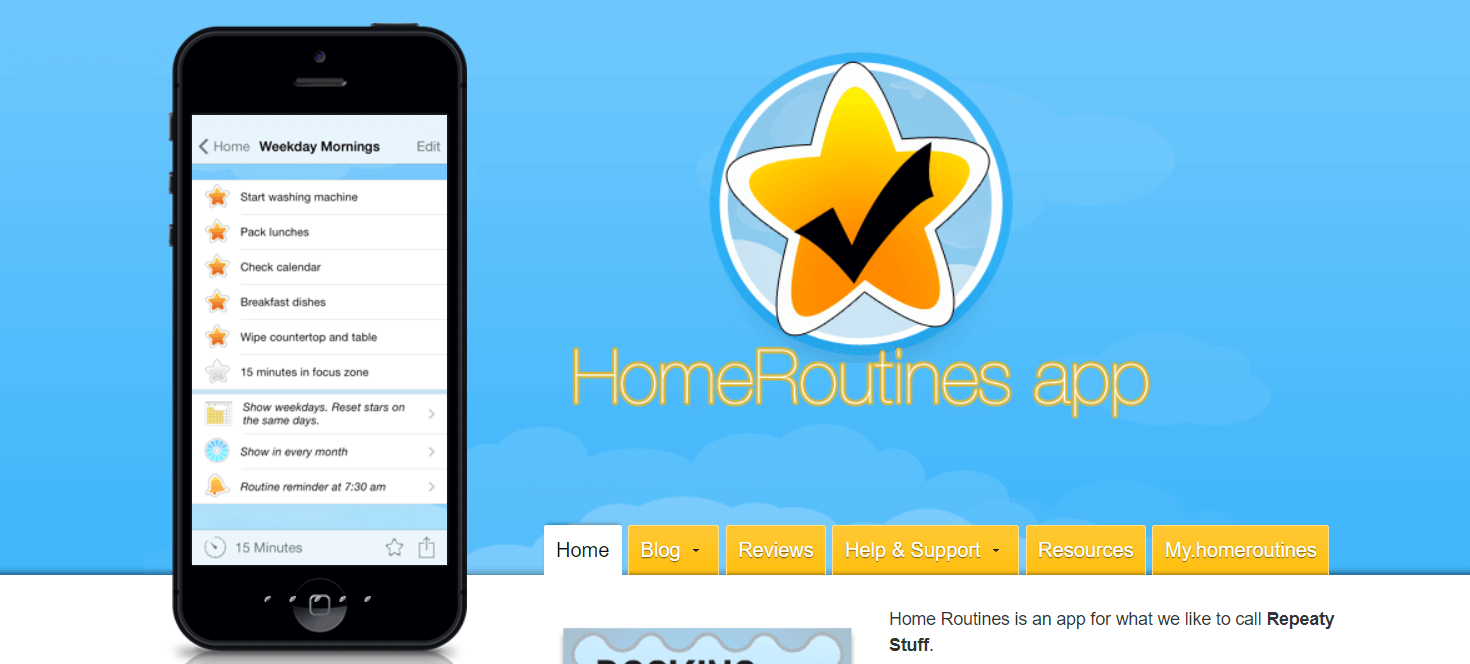
If regular repetitive tasks won’t let you focus on the more important stuff—this app is for you. Make a checklist of your daily routines, set reminders about what and when you need to complete, and never stress about forgetting about it anymore. Leave that to the app.
8. 30/30
If you struggle with completing your tasks on time, try this app. Arrange all your tasks in a list and assign a time length it will take you to complete each. The timer will give you prompts when you have to switch to the next assignment. The app isn’t cluttered with questionable features and shows only what’s important.
9. Focus@Will
The purpose of this app is to improve your attention and ability to focus. It determines your personality type through a short quiz. Based on your results, it will pick the most fitting audio signal that’s going to boost your productivity and focus. You also have access to more than 50 other sounds if you’re eager to try things out and experiment with the effect.
10. Rescue Time
This is a time management app that helps you to see how much time you spend on tasks, and how much of it can be saved if you increase your productivity. You’ll receive detailed weekly reports to check your performance. You can also set goals and track your progress on the app’s dashboard.
Fabulous can help you to build habits that help to improve your physical and mental wellbeing. The app also helps to improve the quality of sleep, identify the current problems that won’t let you stay on the track, and increase your energy level. This is a must-try for any ADD/ADHD student. It’s available both on iOS and Android.
12. NeuroNation—Brain Training
Here’s another multiplatform app that every person (especially students) with ADD/ADHD should check out. NeuroNation is designed to help people with ADD and those who struggle with remembering information through scientifically tested methods of brain training. The app is available on Android and iOS.
13. Todoist: To-Do List, Task List
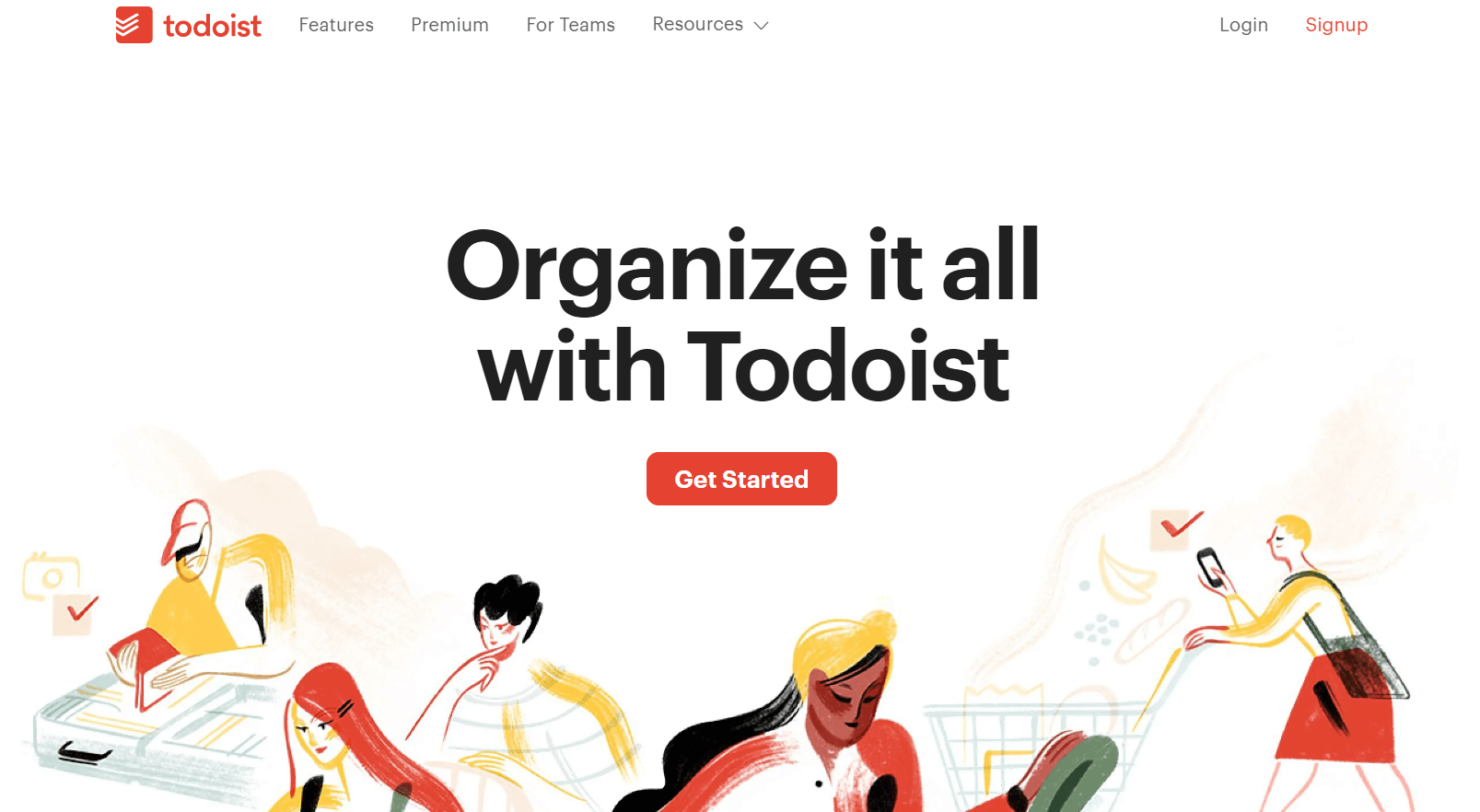
This is an iOS and Android app that allows you to create to-do lists (which is quite easy to guess from the app’s name). It’s a perfect fit for students, teachers, employees, and parents who want to improve their time and task management. The app is also great for people with ADD/ADHD, as it takes away the struggle of keeping all the important tasks in mind and focusing on important things. For instance, you can create one big project, divide it into subtasks, and set reminders (via email, along with push and SMS notifications) for each of the individual assignments.
This app helps to improve memory skills and overall cognitive performance in a game form. The app was designed with all age groups in mind. It’s aimed specifically at students who have ADD/ADHD to help them enhance their thinking speed and accuracy, improve reflexes, and boost memory capacity. Skillz is also available for iOS.
15. Productivity Challenge Timer
This is a productivity application that can help to stay focused and increase productivity. This is always a struggle for students with ADD, so this app will be of great use when you don’t want to waste time and need to complete important tasks. The app allows users to challenge themselves in order to work harder and monitor their work habits. It’s suitable not only for students, but also for parents, teachers, and employees.
16. Asana
Asana provides a workspace for users to collaborate in. It’s a work management platform that helps to streamline the process of completing tasks together. It allows you to keep track of the progress, communicate with members of the team, and stay focused on achieving the end goal. It’s especially useful for collaborative assignments and group projects. But it can also be used for pretty much any other task, as long as it helps to improve ADD students’ performance.
17. Momento
This is a personal journal that allows you to keep track of what you’ve done and where you’ve been. You can complete your memories with not only notes but also add pictures and videos, tag places, and people. It also has a search feature, so you can easily find a specific record of your journal.
18. Priority Matrix
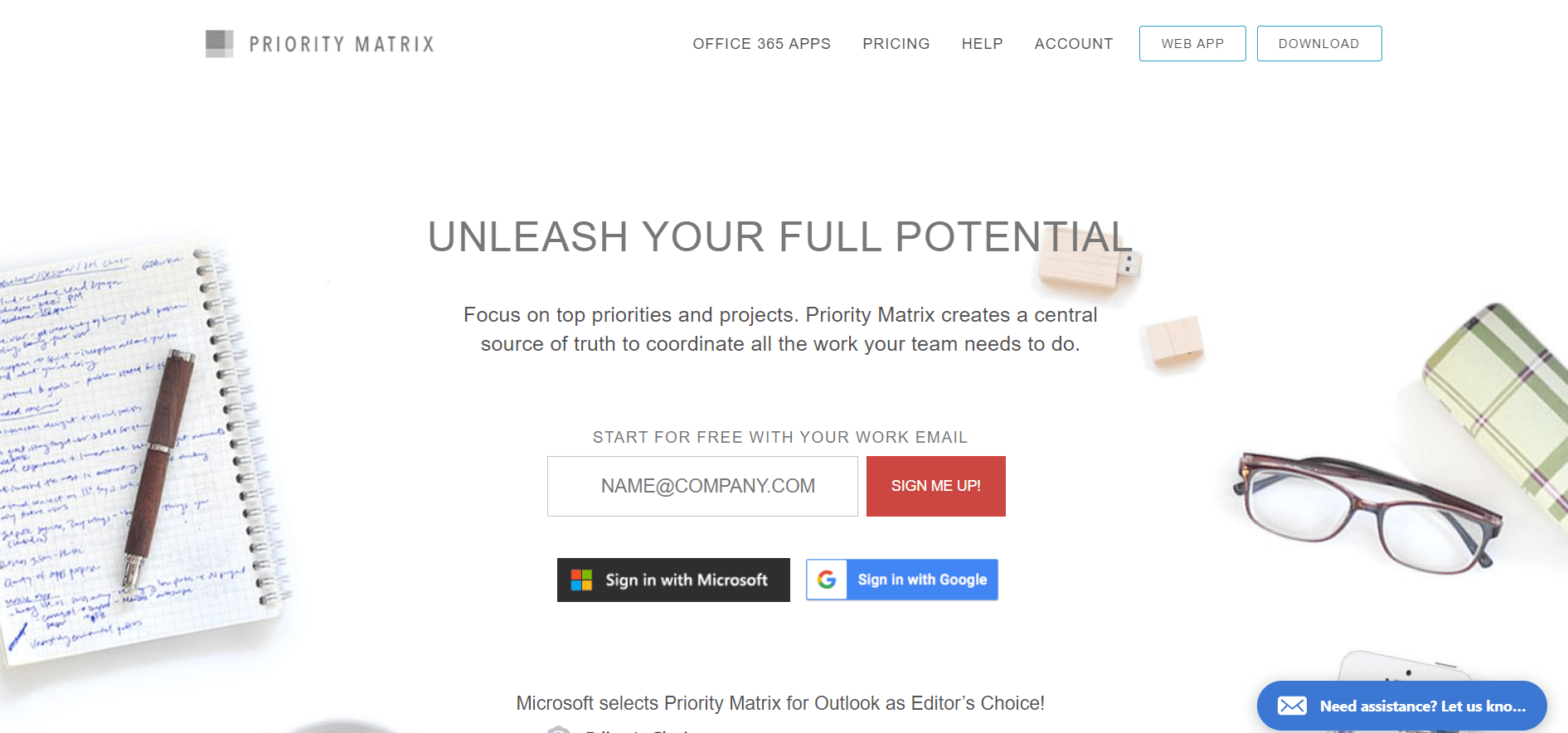
This tool allows you to prioritize your tasks and organize the work process. You can work on projects on your own, or organize a team and achieve your goals together. The platform supports real-time updates on tasks, can create reports, send reminders, and integrate with calendars, emails, Evernote, and Google Docs.
19. Storybird
Storybird acts as a writing aid for students who struggle to deliver a compelling story. It allows a student to express themselves through texts. The tool can provide custom-made images to inspire writers and make a nice visual addition to the story itself. It can also assist in putting all the events in a proper sequence.
20. SpellBetter
This app is going to help students with ADD capture their thoughts and ideas in writing. It will take care of spelling so you can focus on something more important. The program has auto-completion and word prediction features, which can figure out even the toughest spelling mistakes. It also has a text-to-speech feature to ease up the proofreading of your texts.
21. Any.do
Any.do can become a perfect solution to managing busy schedules. It allows users to create to-do lists and set reminders. Without all the unnecessary clutter, questionable extra functions, or confusing interfaces. As simple as that. This is a cross-platform app, and it works on pretty much any gadget or device you can think of.
22. Finish
This application can make prioritizing any list much less of an issue. If you’ve listed plenty of tasks and have a hard time putting them in the right order, Finish can help you get rid of the chaos. With three adjustable priority levels and regular reminders, you won’t forget about anything important and will do all that’s necessary on time.
23. Time Timer
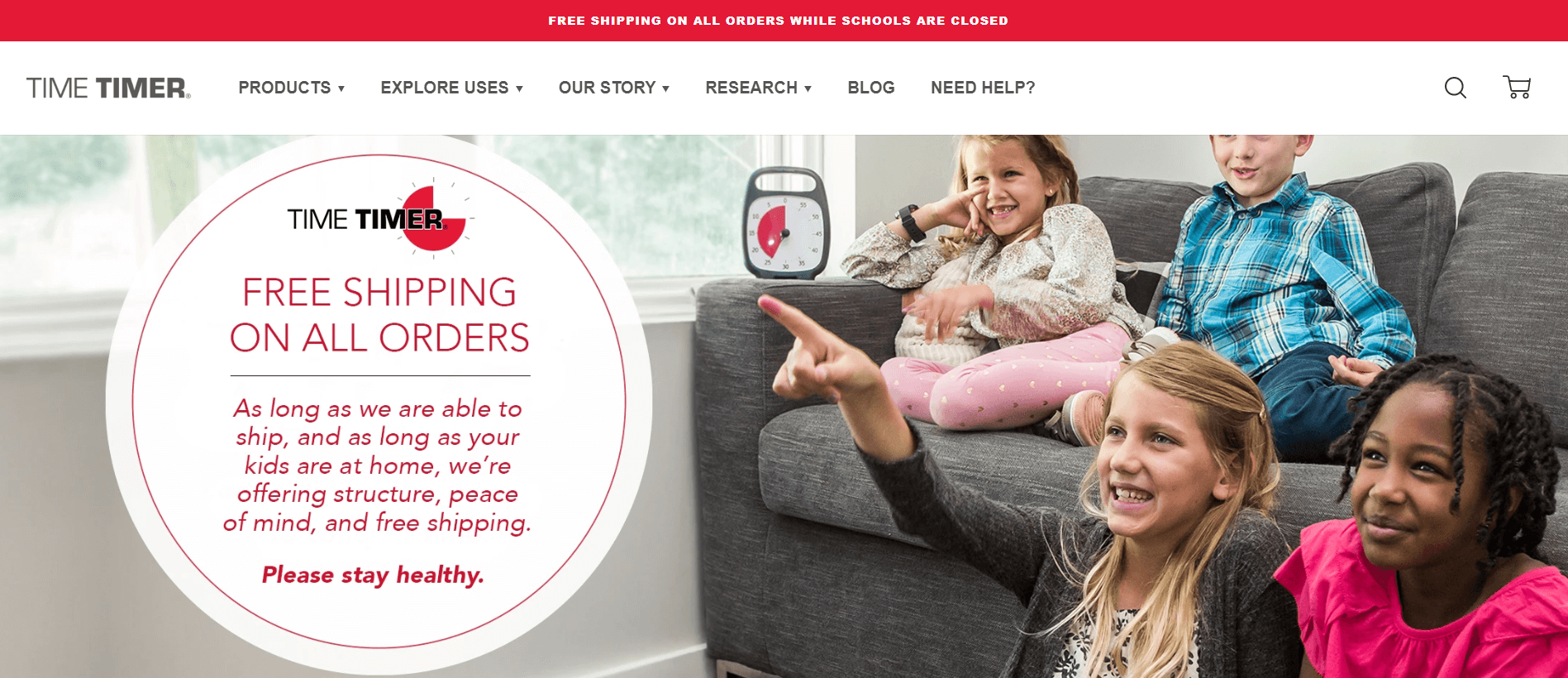
Time Timer is a simple tool that will help you effectively track time and not get lost in the moment. If it’s hard for you to focus on a task or come back from the break—this app will make sure that you stay productive and don’t waste a minute.
24. CueBrain
This app will become a great find for students who learn English as a second language (or any other language, really). It implements training sessions in the form of quizzes and interactive flashcards, which makes it easy and comfortable to study on the go. The app also provides the progress tracking feature, so you’ll always know how good you’re doing.
This is an incredibly powerful formula calculator that can replace a couple of applications at once. It contains a vast database of formulas and equations for physics, chemistry, and math. There’s also a formula solver that allows students to momentarily check their results or get assisted in case of struggling with a particularly tough problem.
26. MindMeister
MindMeister is a multiplatform mind mapping tool. It has all the necessary functions to efficiently map out your ideas and plans, complete them with useful attachments, and organize several maps into thematic folders. This is a single place to keep all your essentials, which can help you become more focused and productive.
27. Self-Control
Sometimes the Internet can be too much. Instead of being an outstanding source of knowledge, it can become one huge distraction. That’s why Self-Control app was created. It allows you to block all the distracting websites for a set period of time when you’re trying to study or do anything important. Even if you decide to delete the app, blocked websites will still be unavailable until the set time runs out.
28. Lumosity
Lumosity app will help you to unveil your brain’s full potential. It contains more than 40 brain exercises in the form of games. They were crafted by neuroscientists to train your attention, memory, and boost the other cognitive skills. The app also contains a personalized training option, as well as brain tests.
29. Socrative
Socrative is an impressive software solution that’s going to be equally useful both for students and teachers. It improves lesson engagement through educational games and quizzes and provides real-time data on academic performance. The app can help understand how well the new material is comprehended and allows you to give instant feedback.
30. Instapaper
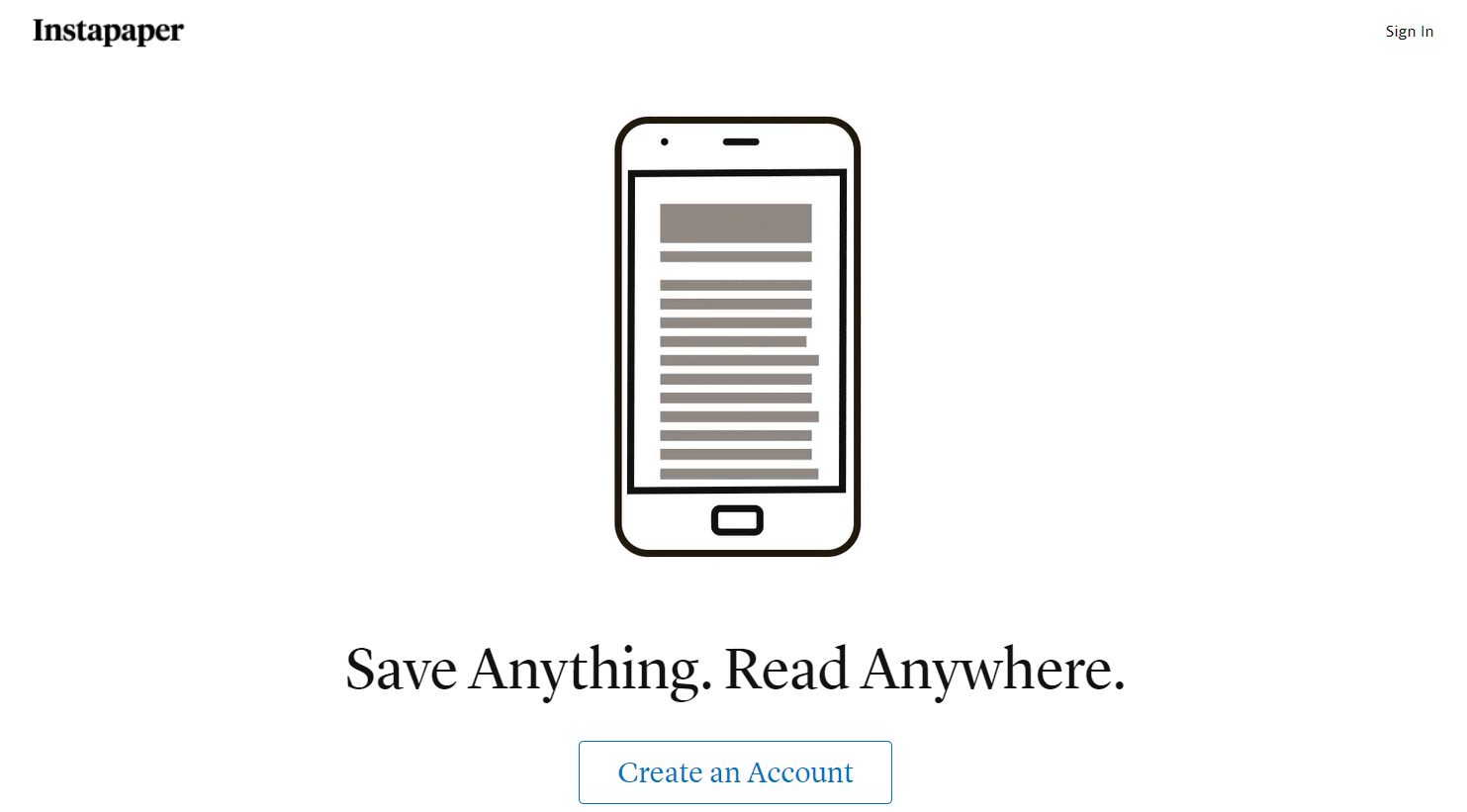
This platform allows students to keep all their sources in order. During the research, you can save any resource in one place, whether it’s an article or a video, so that you know where your information comes from. When the data is saved, you can access it from any device.
31. Writing Prompts
This app can help students who struggle with creative writing. It provides inspiration through generating images, phrases, words, or a plethora of other prompts that could help you get into the right writing mood. This is a cross-platform app that’s available for iOS, Android, and Kindle Fire.
32. InstaGrok
InstaGrok is a search engine developed specifically for educational purposes. It can find the most useful and relevant information on a specific topic and show it in a compact and easy-to-understand way. It will pick out key facts and provide a list of links to original resources along with thematic images, quizzes, and videos. There’s also a journal where students can take notes and save useful materials. The service is available on iOS and Android, as well as through web-interface.
33. StudyBlue
This is a simple solution for students allowing them to take quizzes, create customizable flashcards, and track their academic performance. It has an automatic system for self-evaluation to let you know how well you’re doing. Apart from that, the platform lets students collaborate on their projects.
34. Cram
From now on, the only cramming you’ll do is using this service. Cram is a platform to make flashcards and multiple-choice questions to gain new knowledge and test what you’ve already learned. It has a performance assessment feature, which will make it easier to track progress. You can work with the service on your browser or through an iOS or Android app.
Websites and Resources
35. VeryWellMind
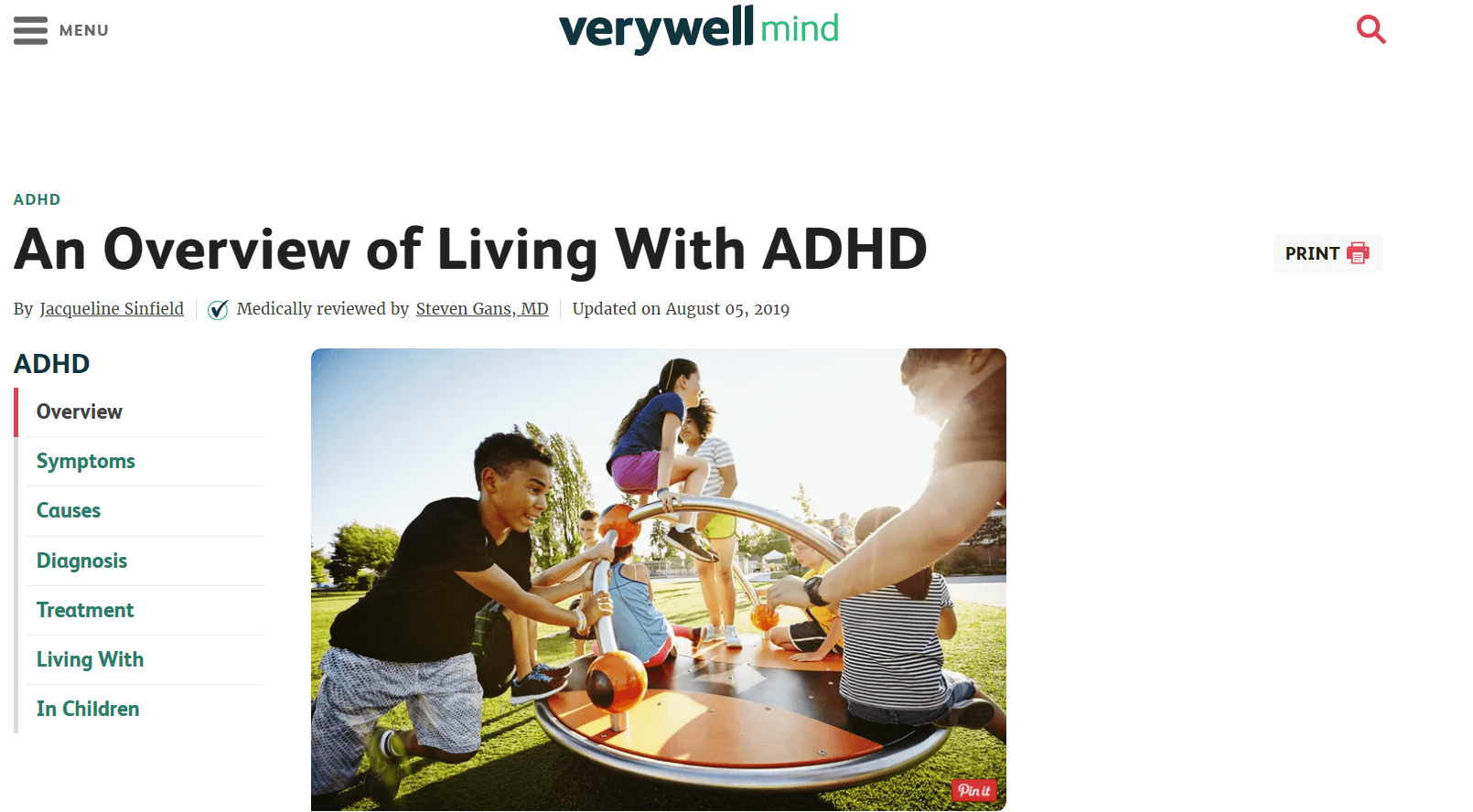
The ADD/ADHD section of the VeryWellMind website provides an essential description of the condition. It talks about symptoms, how to diagnose it, and what treatment is available. There are numerous related articles giving insight into all the possible aspects of the condition itself, as well as living with it.
36. Intrinsic Motivation and Magical Unicorns
This Psychology Today verified blog is run by David D. Nowell, a clinical neuropsychologist. He talks on the topics of self-regulation, time management, focusing, and sustaining happiness. As many ADD students struggle with managing their time and having at least some order in their everyday life, Mr. Nowell’s advice can come in handy.
37. Positive Thinking and ADHD: ADDerworld
Bryan Hutchinson, the author of this blog, has written several books about living with ADHD. These books received critical acclaim, and some of them even went viral. Bryan uses his blog to discuss “everything and anything about ADD.” Even though there haven’t been new posts for a while, there’s a solid backlog of articles to browse through, so it’s going to be worth your while.
38. ADD Consults
Here’s another place to check out if you’re looking for a helpful ADHD resource. It offers consulting online group coaching program, and books. The website also has the Resources section, where you can find more places related to the topic of ADD. Apart from all of that, there’s a blog full of articles about various aspects of ADD and living with ADD. Tips, discussions, advice, life experiences, professional recommendations—you name it.
39. CHADD
Children and Adults with Attention-Deficit/Hyperactivity Disorder is a non-profit organization operating on a national level. Their mission is to support people with ADHD and improve their lives in any way possible. It has the exhaustive information section on the condition, provides plenty of resources and publications, and has much more to check out. So definitely go and have a look.
40. ADHD & You
This website offers information on ADHD and support to teens, adults, and parents. Apart from detailed theoretical information, the site also gives practical tips and advice. It provides recommendations on how to cope with the condition and successfully complete everyday tasks, as well as achieve large-scale goals.
41. ADDitude
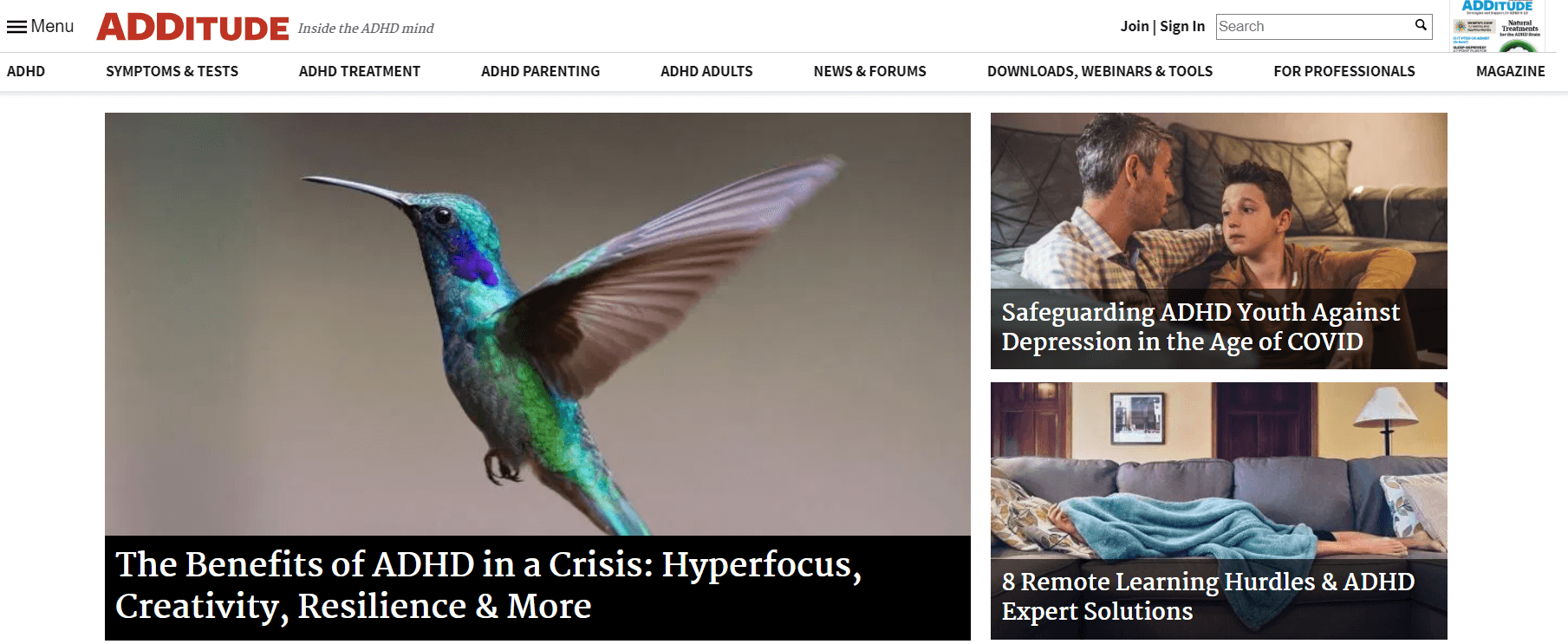
Another resource that every person with ADHD should know about. It unites people living with the condition and professionals who work towards treating it. The website has all that’s necessary to become a go-to ADD resource for anyone interested.
42. TotallyADD
The goal of this website is to help people affected by ADD and inform anyone who wants to know more about the condition. It has an extensive blog filled with articles from top ADHD experts, informative videos on the matter, and self-assessment tests. The site also offers to coach and provides additional resources, as well as ADD-friendly tools.
43. ADDA
The Attention Deficit Disorder Association is one of the leading organizations aimed at helping people living with the condition. This non-profit organization operates for more than 25 years, helping adults and children to cope with ADD and improve their everyday experiences. It not only provides useful information but holds numerous events, offers consultations from acclaimed specialists in the field, helps adults to find work and students to complete their studies successfully.
44. mindyourmind
mindyourmind is a resource dedicated to covering mental health wellness in general, uniting people that have completely different conditions. It sends the message that life goes on no matter what, and if you’re willing enough, you can cope with anything. The site offers a full spectrum of resources and services to help and make the lives of people with mental health problems better. This is a whole friendly community, which you’re welcome to join.
The site offers a selection of publications, reports, and resources on a variety of topics concerning mental health in teens. They base their recommendation on scientific findings and interpret them so that the information is easy to understand and apply in real life. There’s a set of criteria that allows this resource always to provide materials of consistently good quality.
46. ADHD Health Center at WebMD
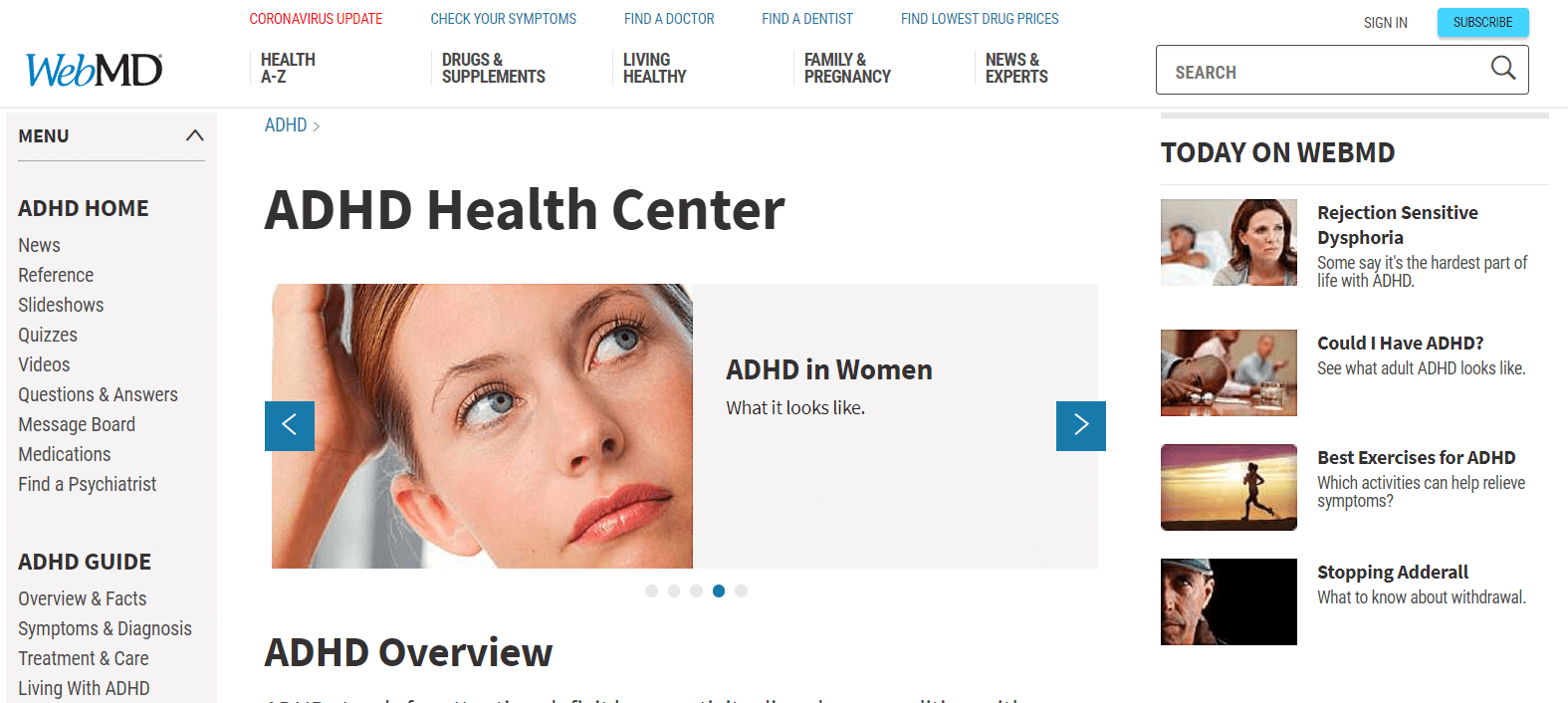
This is a section at the WebMD site dedicated solely to ADHD. It’s filled with informative videos and features, provides helpful and detailed guides, reports the latest news. There’s also plenty of practical and theoretical information that covers virtually all aspects of the condition.
47. Living with ADD
Tara McGillicuddy is a recognized ADHD expert. She provides support and educates people affected by the condition. She hosts a podcast where she holds conversations with other specialists in the field of ADD treatment, discusses the latest events, and helps people improve their lives.
48. Inside ADHD
This educational website is aimed at parents whose kids have ADHD, adults with ADHD, and school specialists who work with students affected by ADHD. It offers varied helpful and well-organized materials, treatment suggestions, and practical tools.
💡 ADHD: Where to Get Help?
ADHD is so varied that, unfortunately, no single solution to the issue has been invented yet.
But.
People living with the condition still have plenty of options where they can seek help.
Organizations
One of the options we’re talking about is organizations like ADDA and CHADD (websites of which we mentioned in the previous section of our guide). Their sole purpose is to provide any possible assistance to people with ADHD to make their lives better.
Some of ADHD help organizations we haven’t mentioned before include:
- Centre for ADHD Awareness Canada, who work on shifting the opinion of people on the condition, raise their awareness, and empower those who got affected;
- LD Online with the goal of giving children and adults the chance to reach their full potential;
- American Academy for Child and Adolescent Psychiatry. They cover a multitude of mental health conditions and have an extensive section dedicated to ADHD;
- ADHD in Adults, who educate people and medical professionals, providing tested and approved information about the condition.

Support Groups
Another option is joining the support group. Such groups unite people dealing with the same issue. It allows for meaningful discussions, experience exchange, and mutual help.
Support groups usually have regular meetings, giving people a chance to make new friends, share ideas and strategies, and just showing they’re not alone.
CHADD has developed an affiliate network, uniting support groups all over the United States. For easier search, they’ve created and Affiliate Locator, helping you to find the nearest group to your area.
Specialists
Surely, no one forgets about ADHD experts. They’ve spent numerous years (or even decades) studying the condition and finding ways to make lives of people having it more manageable.
So what doctors can help? The list is quite broad:
- Family Doctor or Primary Care Physician
- Psychiatrist
- Developmental and Behavioral Pediatrician
- Psychologist
- Psychopharmacologist
- Licensed Mental Health Counselor or Licensed Professional
- Neurologist and Neuropsychologist
Professional ADHD organizations have extensive listings designed to help people find fitting experts:
- The ADDitude Mag Directory Listing
- Attention Deficit Disorder Association Professional Directory
- CHADD Resource Directory
ADHD Coaching
Another thing we should mention if we talk about getting help is ADHD coaching.
What is it all about?
In its essence, ADHD coaching is a complementary treatment. It is delivered by a trained professional with the goal of addressing everyday challenges the condition brings.
Another helpful thing coaches can do developing a set of abilities to tackle the major issues.
- Successful goals reaching. It can be anything from switching to a healthy lifestyle to achieving career goals, to being able to manage your own household.
- Being more organized. This includes management of your tasks and projects, time management skills, setting priorities, developing a workflow, and much more.
- Having more control over your emotions. The focus is on lowering anxiety and stress, improving self-esteem, and managing mood swings, among other things.
- Grasping new skills. Including but not limited to efficient problem solving, communication skills, punctuality, and solving problems.
That’s it for our definitive ADHD guide.

We hope that you were able to find some useful information that can come in handy later. Make sure to share your thoughts and ideas about the article or the topic in general in the comments below.
Don’t be shy! We appreciate your feedback.
🔗 Resources
- Ten Tips for Going to College With ADHD
- ADHD Factsheet
- Attention Deficit Hyperactivity Disorder—An Overview of ADHD in Adults
- Five Helpful Study Tips for Students With ADHD
- Ten Study Tips for ADD/ADHD Students
- College Students with ADHD
- Studying with ADHD: Common Challenges for College Students & How to Overcome Them
- Seven Secrets to Studying Better with ADHD
- ADD & ADHD Treatment
- Attention Deficit Hyperactivity Disorder (ADHD)
- Treatment of ADHD
- Everything You Need to Know About ADHD
- Tips for Managing Adult ADHD
- ADHD in Children
- Attention-Deficit/Hyperactivity Disorder (ADHD): The Basics
- What Is Attention Deficit Hyperactivity Disorder (ADHD)?
- What Is ADHD?
- The Importance of Recess for Children With ADHD
- Ten Problems That Could Mean Adult ADHD
![ADHD 101: A Definitive Guide for Students [+Tools & Resources]](https://ivypanda.com/blog/wp-content/uploads/2020/10/0-title-image-fidger-spinner-736x491.jpg)

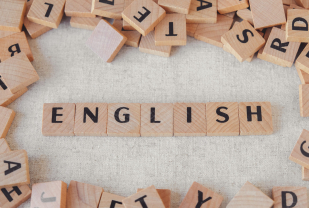
![27 Public Speaking Anxiety Tips [+ Bonus: Online Courses]](https://ivypanda.com/blog/wp-content/uploads/2019/07/microphone-with-unfocused-background-audience-309x208.jpg)
I was looking for a resource that provides the detailed explanation on ADHD, this is one of the best material available. Knowledge required to face it effectively, is also very well provided. Tools gathered to aid the process is just awesome. Thank you ivypanda. Cheers
Thanks for the feedback! Much appreciated.